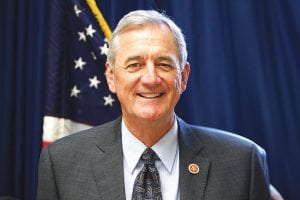A study measuring legislative effectiveness conducted by noted Vanderbilt University of political science/ public policy professors Craig Volden and Alan Wiseman rated U.S. Rep. Rick Nolan among the “10 most effective members of Congress.”
That’s pretty good when considering there are 535 members of Congress.
Nolan was ranked the second most effective Democrat and ninth overall in the study, which was recently published in the Washington Post.
The professors measured how successful each representative was at moving his or her own sponsored bills through the lengthy legislative process and then determined which of these bills amounted to substantive change.
Nolan was lauded for his efforts in carrying on the work of Chip Cravaack, the man he beat to represent the Eighth District, to reestablish rights under the land treaty of 1854 for the Fond du Lac and Grand Portage Bands of Lake Superior Chippewa. He also passed a federal land exchange bill for the Grand Rapids school district, and passed a bill naming a portion of Interstate Highway 35 for the late Congressman Jim Oberstar.
Nolan also was instrumental in getting the Airplane Revitalization Act passed. This bill streamlined FAA regulations for Cirrus Aircraft in Duluth, which helped Cirrus expand and provide more jobs for the region.
TIME Magazine singled Nolan out for his leadership role in keeping U.S. troops out of Syria.
As the only member of the Minnesota delegation serving on the House Transportation Committee, Nolan added an amendment to the Water Resources bill to close the St. Anthony Lock & Dam in Minneapolis to prevent invasive Asian carp from spreading further into Minnesota rivers and lakes. Nolan also added another amendment which expanded the definition of “invasive species” to include plant life, which give the U.S. Army Corps of Engineers new resources to combat the 150 invasive species that now threaten the Great Lakes
In the study the Vanderbilt professors noted the contentious nature of Congress and the difficulty legislators from both parties had to get support for and pass legislation. “Since the Democrats are in the minority, the five highly effective Democratic representatives have been less successful in moving bills forward. But even they have made headway,” said the professors.



Loading Comments